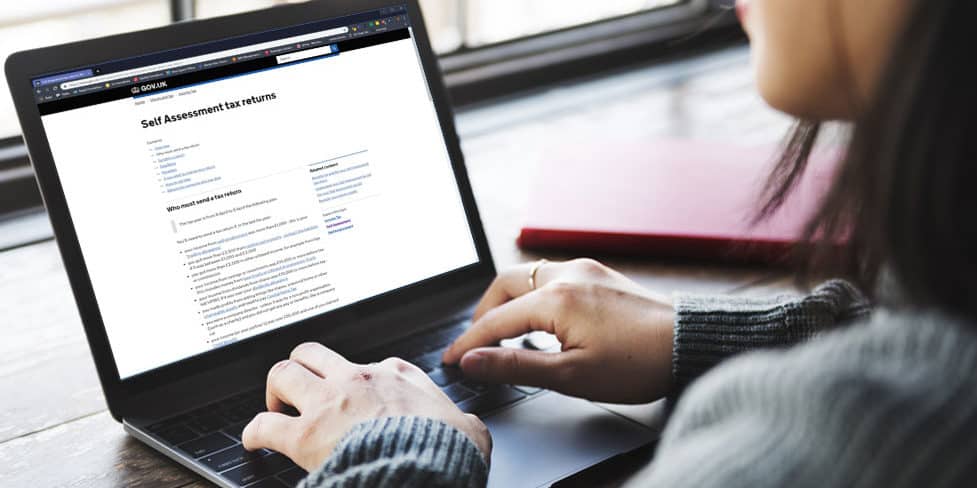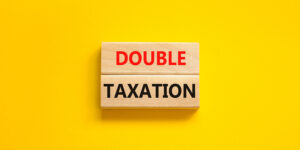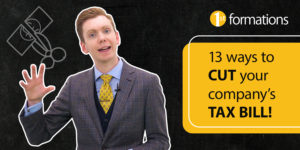If you are required to report any type of income on a Self Assessment tax return, you first need to register for Self Assessment with HMRC. This is a straightforward process that you can complete online or by post, depending on your reason for registering. Most people, including sole traders and limited company directors, can register online.
This post explains who needs to register for Self Assessment, the steps required to successfully complete the process, and what tax you will be liable to pay on the income you declare on your Self Assessment tax return.
Do I need to register for Self Assessment?
Self Assessment is an HMRC system that individuals use to declare personal income that is not taxed via PAYE. Through Self Assessment, users can report and pay tax on these earnings.
Many types of people need to register for Self Assessment and complete personal tax returns for HMRC, including:
- self-employed sole traders who earn more than £1,000 in a year
- limited company directors who receive untaxed income
- company shareholders receiving more than £10,000 in dividends in a year
- partners (members) in general partnerships, limited partnerships, and limited liability partnerships (LLPs)
- employees claiming expenses in excess of £2,500 in a tax year
- any individual with an annual taxable income over £150,000
- anyone who receives rental income above £2,500 from UK property or land
- individuals who had to pay Capital Gains Tax when they sold or ‘disposed of’ something that increased in value
- anyone who has to pay the High Income Child Benefit Charge
You may also need to register and send a tax return if you have other types of untaxed income to declare, such as tips and commission, income from savings and investments, or foreign income.
To check whether or not you need to register for Self Assessment, use HMRC’s online Self Assessment tool.
What is the registration deadline?
If you are required to send a return, you must register for Self Assessment before 5 October after the end of the relevant tax year. For example, the registration deadline for the current 2024/25 tax year (6 April 2024 to 5 April 2025) is 5 October 2025.
How to register for Self Assessment as a self-employed person
If you are a sole trader or a partner in a business partnership, you can register for Self Assessment online. As part of the process, you will be required to create a Government Gateway user ID and password. However, if you already have a business tax account, you can sign in with your existing credentials.
When you have completed this step, you will answer a few questions to specify that you want to register for Self Assessment. You’ll then fill in the online registration form with details about you and your business, including:
- your name (and any previous name)
- National Insurance number
- date of birth
- home address
- telephone number and email address
- the reason you need to register
- business name
- business address (if different from your home address)
- the date you started self-employment
- the type of work you do (e.g. plumber)
HMRC’s video on registering for Self Assessment as a self-employed person provides step-by-step guidance on completing each section of the form.
Once you’ve registered, HMRC will enrol you for the Self Assessment Online service. Within approximately 1-2 weeks, you will receive your Unique Taxpayer Reference (UTR) and an activation code in the post. You need these to sign in to your account and activate the Self Assessment service.
You must activate your online account within 28 days. Simply log in with your Government Gateway credentials and enter the activation code when requested. If the code hasn’t arrived after 21 days of registration, you can find out online when to expect your activation code.
You will continue to use your UTR for as long as you report through Self Assessment. You’ll need to provide it whenever you file tax returns, pay self-employed taxes, or contact HMRC about anything else related to Self Assessment.
How to register for Self Assessment as a company director and shareholder
If you are a company director (but not a shareholder), you only need to register for Self Assessment if you receive any untaxed income from the company, or if your salary is over £150,000.
However, if you earn more than this or you receive expenses and taxable benefits, dividends from shares, or any other type of untaxed earnings, you must register and complete an annual tax return.
To begin, create a Government Gateway user ID and password (or sign in to your existing account if you already have one).
Next, visit online.hmrc.gov.uk/shortforms/form/SA1 and sign in to your tax account with your user ID and password. The registration form will appear on-screen. Provide the following information on the form, where applicable:
- your full name, and any previous name
- National Insurance number
- date of birth
- your personal UTR (if you already have one)
- your residential address and the date you moved there
- telephone number and email address
- select your reason for registering – e.g. ‘I am a company director’ and/or ‘I’ve untaxed income which cannot be coded in PAYE’
- date on which you received untaxed income
HMRC’s video on registering for Self Assessment if you’re not self-employed (which, as a director or shareholder, you are not) provides step-by-step guidance on successfully completing the registration process.
Within approximately 1-2 weeks, you should receive your UTR (unless you already have one) and an activation code in the post. The UTR relates only to you – it is not the same as your company UTR.
Be sure to activate your online account within 28 days by logging in with your Government Gateway credentials and entering the activation code when requested.
Dividend Tax Calculator
Can I register for Self Assessment by post?
You may need to register for Self Assessment by post rather than online if you:
- receive income from UK land and property
- have taxable foreign income
- have adjusted net income over £60,000 and either you or your partner continue to receive Child Benefit payments
- have yearly income over £150,000
- receive yearly income from a trust or settlement
- receive untaxed income that cannot be collected through your PAYE tax code
- have Capital Gains Tax to pay
- are unable to register online for any particular reason
To register by post, you will need to complete form SA1 online, print it, sign it and enter the date, and then post it to:
HM Revenue and Customs
NIC&EO
BX9 1AN
If this option is not suitable for you and you require a more accessible format, email HMRC [email protected] and specify the format you require.
How do I file a Self Assessment tax return?
You can complete and file your Self Assessment tax return online or by post using form SA100. You can do this yourself or appoint an accountant to take care of it for you. It’s relatively easy to file a return yourself if your accounts are simple and you use HMRC’s free Self Assessment online service.
However, if your accounts are complex and you have to file lots of supplementary pages (e.g. if you’re a director and shareholder, a landlord, or a non-UK resident) you may wish to consult an accountant or other tax specialist for advice.
- Do I need an accountant to do my Self Assessment tax return?
- The top 10 Self Assessment tax return mistakes – and how to avoid them
- 12 Self Assessment expenses you didn’t know you could claim
When filing online, the Self Assessment system will automatically work out your tax and National Insurance liabilities during the process, so you will be told how much you have to pay as soon as you’ve completed the return.
If you need to send your tax return by post rather than online, you must call HMRC to request the paper version of the SA100 tax return. You can download all other supplementary pages you need and include them with the main form.
Self Assessment filing deadline
The deadline for filing your Self Assessment tax return is either midnight on 31 October (for paper returns) or 31 January (for online returns) following the end of the tax year. For example, the filing deadline for the 2024/25 tax year is 31 October 2025 or 31 January 2026.
Provided that you register for Self Assessment and activate your online account by the registration deadline, you can file your tax return at any time after the end of the tax year.
How much tax will I pay through Self Assessment?
Through Self Assessment, you pay the same rates of Income Tax as employed individuals who are taxed through PAYE. Every person born after 5 April 1948 with an annual income below £100,000 is also entitled to the full tax-free Personal Allowance of £12,570.
If you live in England, Wales, or Northern Ireland, any income you receive above the Personal Allowance will be taxed at the following rates of Income Tax:
- 20% basic rate – up to £50,270
- 40% higher rate – between £50,271 and £125,140
- 45% additional rate – income above £125,140
If you live in Scotland, you’ll pay the following rates of Scottish Income Tax on any earnings above the Personal Allowance:
- 19% starter rate – up to £14,876
- 20% basic rate – between £14,877 and £26,561
- 21% intermediate rate – between £26,562 and £43,662
- 42% higher rate – between £43,663 and £75,000
- 45% advanced rate – between £75,001 and £125,140
- 48% top rate – income above £125,140
You can use HMRC’s online self-employed tax calculator to estimate your tax bill for the current 2024/25 tax year.
What about tax on dividends?
If you are a company shareholder and need to pay tax on dividend income, you will pay the following rates of dividend tax:
- 8.75% – dividend income that falls within the basic-rate Income Tax band
- 33.75% – dividend income that falls within the higher-rate Income Tax band
- 39.35% – dividend income that falls within the additional-rate Income Tax band
To work out your dividend tax, you need to add together your income from all sources (e.g. salary and dividends) to determine which tax band(s) apply to you.
What National Insurance will I pay through Self Assessment?
Most people who are registered for Self Assessment are required to pay Class 4 National Insurance contributions (NICs). From 6 April 2024, the requirement to pay Class 2 on earnings above £12,570 no longer applies to self-employed people.
If your annual profits are £6,725 or more, Class 2 NICs are treated as having been paid, so your National Insurance record is protected. However, if you earn less than this, you can choose to pay voluntary contributions.
The National Insurance you will pay on income earned in 2024/25 will be calculated when you complete your Self Assessment tax return after the end of the tax year.
- Class 4 is charged at 6% on profits between the Lower Profits Limit (£12,570) and the Upper Profits Limit (£50,270), then 2% on profits above £50,270
- Voluntary Class 2 contributions are £3.45 per week
National insurance should be paid through Self Assessment by midnight on 31 January after the end of the tax year. This means that your NICs for the 2024/25 tax year are due by 31 January 2026.
Thanks for reading
We hope this post has provided you with the required knowledge to feel confident registering for Self Assessment with HMRC. It’s pretty straightforward and easy to do, so you shouldn’t have any difficulty.
However, we do recommend appointing an accountant to help you with your tax returns. They will also be able to advise on ways to minimise your tax burden.
Check out the 1st Formations Blog for more business advice, insights, and guidance.






Join The Discussion
Comments (28)
I have a UK Limited company but I’m not resident and I don’t have any of the UK countries nationalities. Shall I register for the self-assessment as a company director? noting that I’m not registered on Paye as I don’t give myself a salary from the company.
Thank you for your kind enquiry, Osman.
Company directors need to register for Self Assessment if they are in receipt of any taxable income – even if it is not via PAYE. If you do not receive any income, you will not need to register for Self Assessment.
We trust this information is of use to you.
Kind regards,
The 1st Formations Team
Good Afternoon,
I hope you’re well.
I have worked as self-employed in 2015 (November (1day), December (1day) ) and 2016 (January (1day), February (1day), and March (1day)) and I have earned a total of £700 for that tax year.
My question is:
I thought that my income was too low in order to register (as self-employed) and declare my income.
Did I do it right? If not, How do I declare this income?
Best Regards,
Jr
Thank you for your kind enquiry.
The rules relating to registering for Self Assessment are that you must report any untaxed income over £2,500 via a Self Assessment tax return. For income amounts lower than this figure, you may not have to complete a tax return, but you are legally required to report such income by contacting HMRC. You can find contact details for reporting income to HMRC here: https://www.gov.uk/government/organisations/hm-revenue-customs/contact/income-tax-enquiries-for-individuals-pensioners-and-employees
I trust this information is of use to you.
Kind regards,
The 1st Formations Team
Will I get fined for that?
Thank you for your help with this matter. I really appreciate it.
Best Regards,
JR
Hi JR,
There is no automatic fine or penalty for failing to register for Self Assessment. However, once registered, if you fail to send your return in on time and have not been granted an extension, penalties can range from £100 up to 100% of your tax bill. You must all make any payments on account to HMRC by 31 January of each year, and if you do not do so, HMRC will charge you interest on late payments.
Should you require any further clarification, please leave a follow up comment.
Regards,
The 1st Formations Team
Hi, I have been working abroad (China & Myanmar) for the last few years, working for local Chinese and Burmese companies and paying tax in those countries. The only UK income was from interest on UK savings, dividends on UK shares and the rental of my UK home.
For my UK self assessment, I assume I don’t need to complete the sections – Employment; Self Employment; Partnership; Foreign; Trusts; Capital Gains?
For the section on Residence, to the question “Were you, for all of the year 5 April 2020, one or more of the following: not resident; not domiciled; dual resident” I assume I should answer “no”?
Therefore, the only sections I need to complete are Personal Details; Income from Interest & Dividends and UK Property?
Your confirmation would be appreciated.
Thanks a lot
Thank you for your kind enquiry, Mark.
Based on the statements you have made in relation to working abroad in China and Myanmar, we can confirm that your assumptions regarding how to complete the sections of the Self Assessment form you have highlighted are correct, and these are the answers you should input.
I trust this information is of use to you.
Regards,
John
Hello,
I’m employed full time and pay tax through PAYE but have been given the opportunity to do work on freelance basis over and above my day job. This is on a fairly casual basis, so I’m a little confused as to what I need to do in terms of registering to pay the additional tax. If you could clarify, I’d really appreciate the assistance! Thanks, Jane.
Dear Sir,
Thank you for your message.
We are not accountants so cannot give specific advice however it would seem necessary to register with HMRC for Self-Assessment and in the Annual Personal Tax Return, you would declare your freelance income and the income from PAYE.
Best regards,
1st Formations Team.
I set up a Partnership in August 2015. I’m about to register with HMRC and file a tax return, it says you have to register by October 5th in the second tax year, does that mean I should have done it last year or am I still within the timelines?
Thanks
Mike
Dear Mike,
You should have registered the partnership last year however you are likely still within the deadlines to file the first partnership tax return. Please remember you and the other partners will also need to be registered for Self-Assessment.
Best regards,
1st Formations Team
Hi,
How will I be able to know that my business is already enrolled for ‘Self-Assessment tax return’ using my UTR and activation code?
Dear Pradipta,
You should be able to access your personal data on your HMRC account if you have registered to file information online. The online account will tell you which taxes you are already registered for and which taxes are available for you to register for online. IF you are having trouble with the online service there is a specific HMRC Helpline 0300 200 3600
Best regards,
1st Formations Team
Great page!
I have become self employed and registered in November 2016, do I need to complete a tax return for 2015-2016 year? Or do I not have to worry until January 2018?
Thanks
Dear Lianne,
You only need to complete an Income Tax Return for the year when you have become self-employed. The Tax year runs from 6 April -5 April the following year so you would only need to file the Income Tax Return for 2016-17 by 31 January 2018.
Best regards,
Rapid Formations Team
Hi, I’m registered as a sole trader and have completed self assessments for a number of years on a small business. I’ve also been employed by a company and paid taxes through PAYE. In the tax year, 2016-17, I became self employed in my full time job as well and I’m contracted out each day. Do I have to register with HMRC again or complete all my earnings under the same UTR, even though they are different jobs?
Dear Sir
We are not accountants so cannot advise specifically on your personal taxation requirements so we would suggest you seek the advice of an accountant.
Best regards,
1st Formations Team
Hi,
Thank you for this helpful information.
I am mechanic and will start working as self employed for different garages.
Should I register for VAT and charge VAT for my services?
Should I register for PAYE since I am the only employee of my company?
Regards,
Nelson
Dear Nelson,
Thank you for your message.
We cannot advise as to whether you need to register for PAYE or Vat as your circumstances will dictate what is necessary/best for you. For Vat purposes you have to register for Vat if your turnover will be greater than £83,000 in the 12 months following registration. It may however be beneficial to register even if your turnover is below the threshold but you would need to speak to an accountant about this. PAYE on the other hand is not mandatory as there are other ways to pay yourself (ie paying a salary less than PAYE threshold and any further payment could be made in dividends if your company meets the qualifying criteria), but again you would need to discuss this with an accountant to work out what would be best for you.
Kind Regards
1st Formations Team
Hello,
Thanks you for this really useful information
I’ve recently started workings as self employed and registered for self assessment and VAT.
Should I also register for PAYE since I am the only employee of the company?
Best regards,
Nelson
Dear Nelson,
Thank you for your message.
We cannot advise as to whether you should register for PAYE as your circumstances will dictate what is necessary/best for you. PAYE is not mandatory as there are other ways to pay yourself (ie paying a salary less than PAYE threshold and any further payment could be made in dividends if your company meets the qualifying criteria), but you would need to discuss this with an accountant to work out what would be best for you.
Kind Regards,
1st Formations Team.
Since my last tax return, I have become a company director of a small Ltd company, receiving a small PAYE salary. I am also a sole trader (and have been for a few years) and am registered for self assessment. I do not earn enough overall to pay any tax (I am also a full time parent). Do I need to register differently for self assessment now that I am a company director?
Many thanks.
Dear Lisa,
We are not able to provide taxation advice of this nature and would suggest you contact an accountant to access the correct advice for your situation.
I do however enclose a link from the gov.uk website which may be of some assistance to you https://www.gov.uk/self-assessment-tax-returns/who-must-send-a-tax-return
Best regards,
1st Formations Team
This was really helpful, thanks, I have a question, I officially started working as a sole trader on 3rd October and registered today, so I obviously haven’t learnt any money yet, do I still need to file a tax return form? As there is no information here if you register posy 5th October. Also if you register as a sole trader with HMRC, does this mean you have also automatically become VAT registered or do you do this a different way afterwards (This is not something i need to do, I just want to understand the process). I would really appreciate a little help on these things.
Hello,
If you register on October 3rd, you are trading in the 2016-17 tax year, which runs from April 6th 2016 to April 5th 2017. Your first tax return will not be due until 31st January 2018, so you have plenty of time! Your tax for the current 2016-17 tax year is also due by 31st January 2018.
You are not automatically registered for VAT, no – you must do this separately.
Best wishes and good luck with the new business!
Rachel
I am setting up a small LLP who wished to trade in the UK market, both to retailers and online.
I have started the process to become volunteraly VAT registered and register for Self-Assessment, however myself and my business partner are currently in full-time employment and pay tax via PAYE.
How will these two methods of tax interlink? Will I continue paying tax via PAYE for my day job, and only pay Self-Assessment tax on my new business profits?
Thanks.
Hi Lewis,
Yes, that’s right – you will continue to pay Income Tax and National Insurance through PAYE on the wages received from your full-time job, and you will be required to report and pay tax and NI on any additional income generated through the LLP.
You will not be taxed twice. However, your total annual earnings (from full time employment and your LLP) must be added together to determine how much additional tax and National Insurance you need to pay through Self-Assessment, e.g. if your total annual income exceeds the basic threshold for Income Tax, you will pay the higher rate of tax (40%) on anything above the basic rate threshold. There is a section in the Self-Assessment tax return that allows you to state your additional income from employment.
I hope this clarifies matters. You may very well be able to complete your own tax return, but start it in good time in case it’s too confusing and requires the help of an accountant.
Best wishes and good luck with the new business!
Rachel